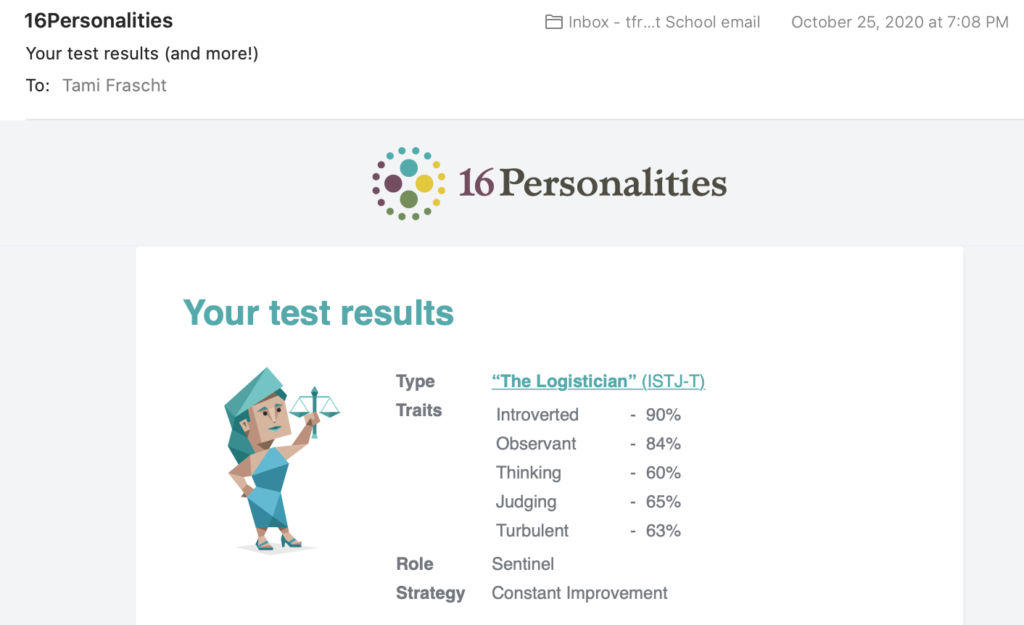Personality Styles
The 16 Personalities Assessment is based on Carl Gustav Jung’s study of psychological traits and the Myers-Briggs test. The 16 Personalities Assessment covers the personality traits of individuals: mind, energy, nature, tactics, and identity and it covers relationships, workplace habits, strengths, and weaknesses.
The Mind aspect shows how we interact with our surroundings. Introverted (I) individuals prefer solitary activities and get exhausted by social interaction. They tend to be quite sensitive to external stimulation in general. Extraverted (E) individuals prefer group activities and get energized by social interaction. They tend to be more enthusiastic and more easily excited than introverts.
The Energy aspect determines how we see the world and process information. Observant (S) individuals are highly practical, pragmatic, and down-to-earth. They tend to have strong habits and focus on what is happening or has already happened. Intuitive (N) individuals are very imaginative, open-minded and curious. They prefer novelty over stability and focus on hidden meanings and future possibilities.
The Nature aspect determines how we make decisions and cope with emotions. Thinking (T) individuals focus on objectivity and rationality, prioritizing logic over emotions. They tend to hide their feelings and see efficiency as more important than cooperation. Feeling (F) individuals are sensitive and emotionally expressive. They are more empathic and competitive than Thinking types and focus on social harmony and cooperative.
The Tactics aspect reflects our approach to work, planning and decision-making. Judging (J) individuals are decisive, thorough, and highly organized. They value clarity, predictability and closure, preferring structure and planning to spontaneity. Prospecting (P) individuals are very good at improvising and spotting opportunities. They tend to be flexible, relaxed nonconformists who prefer keeping their options open.
The Identity aspect underpins all others, showing how confident we are in our abilities and decisions. Assertive (A) individuals are self-assured, even-tempered and resistant to stress. They refuse to worry too much and do not push themselves too hard when it comes to achieving goals. Turbulent (T) individuals are self-conscious and sensitive to stress. They are likely to experience a wide range of emotions and to be success-driven, perfectionist and eager to improve.
Which personality style do you think you are? What personality style do you think your instructors are?
Hint: my personality style is:

When you have completed the assessment, print a screen shot of the results (command + shift + 4). If you need help creating the screen shot, be sure to ask. Also, enter your email address so the results are sent to you for future use.
Download the 16 Personalities Activity Doc document. Print two copies when you are finished: one for me and one for your instructor.
Results:
- Gabby – ESFJ-A Consul
- Cherina- ISFJ-T – Auditory
- Lindsey – ISFP-T – Adventurer
- Ashlynn – ESFJ-T – Consul
- Trishia – ISFJ-T – Defender
- Mattison – ESFP-T Entertainer
- Malayna – ISTS-T – Logistician
- Alissa – ENFJ-T – Protagonist
- Jen – ENFJ-T – Protagonist
- Julie – INFP-T – Mediator
- Jake – INTP-T – Logician
- Brittany- INFP-T – Mediator
Resumes
A template to begin a resume is available – NWTC Nursing resume template.
The following are some examples from ResumeCompanion.com
- Licensed Practical Nurse (LPN) Resume Sample
- Entry Level Nurse Resume Sample
- Medical Assistant Resume Sample
Some additional is available at https://nwtech.edu/alvacc/resumes/